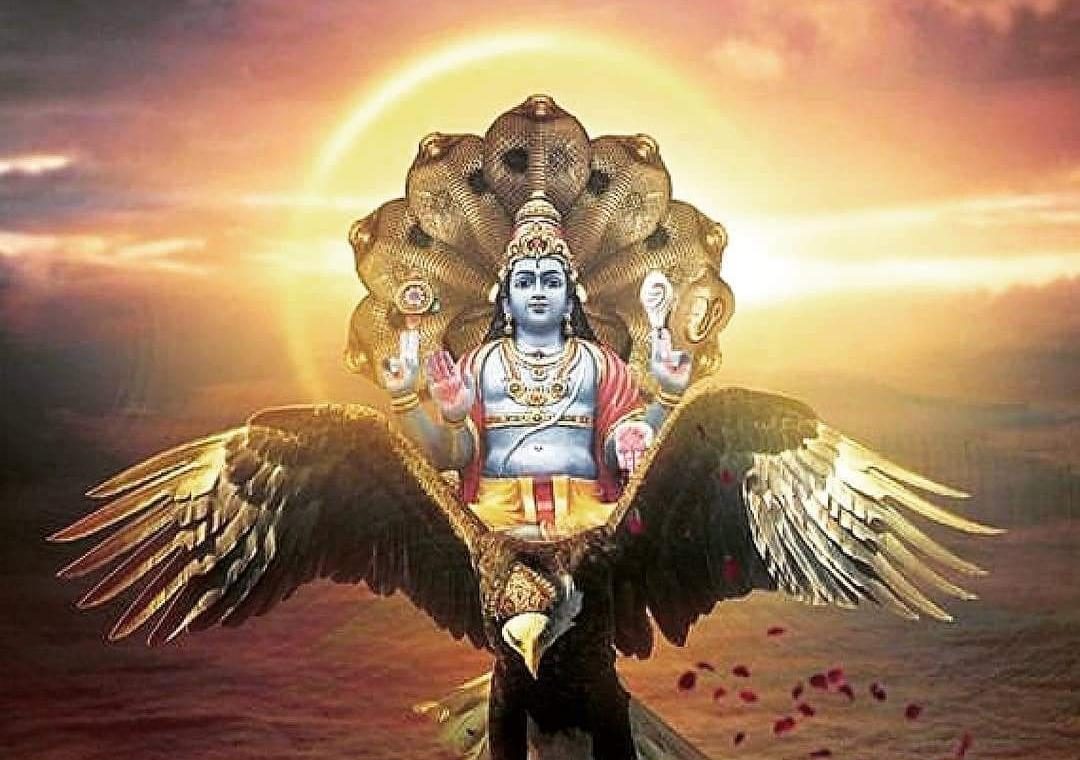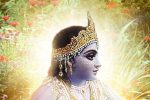NAME 63
Maṅgalam param मङ्गलम् परम्
He is in the state of Supreme Bliss. Brahman is eternal Bliss. That is why it is said that one has to reach the state of bliss to realise the Brahman, who is the embodiment of Supreme Bliss. When one is aspiring to attain liberation, he has to first reach the state bliss as the Brahman is the state of Supreme Bliss. The realisation happens only if one is able to transform himself to the state of Brahman before his final absorption into Him.
This nāma says that one should have purity of mind and thought while seeking Him, who is the source of supreme auspiciousness.
In spiritual pursuit, one has to purify his consciousness as liberation can happen only if everything is purified in the self. A self can unite with the Self only if the former attains the same level of purity of the latter. This is the concept behind ‘I am That’.
Mangalam Param – He is Supremely Auspicious
These are two words but to be counted as a single Nama ‘Ekam naama savisheshanam – Single name with a built-in adjective’. Param means superlative or of the highest order. Mangalam means auspiciousness.
Sri Adi Sankara quotes the following from Vishnu Puraana –
‘ashubhaani niraachashte tanoti Shubhasantatim |
smrti-maatrena yat pumsaam brahma tanmangalam viduh ||’
Meaning: Brahman is known as beneficence because He wards off all evils and brings on a series of benefits to men on being merely remembered by them.
Param just emphasises that He is the Supreme in bestowing good results. Periazhvar has composed the ‘Thiru Pallandu’ extolling the Lord for his eternal existence.
६३. ॐ मङ्गलाय परस्मै नमः |
63. OM Maṅgalāya Parasmai Namaḥ
Param Mangalam -Mangalam is that which not only removes the dark pains of evil, but brings the bright joys of merit. Param Mangalam is Supreme Mangalam, and It can be none other than He, by whose mere remembrance all inauspiciousness gets lifted up and all Auspiciousness comes to flood our hearts The Upanishad declares. “May That Brahman-who removes all inauspiciousness in man and gives man all auspiciousness, by a mere remembrance of Him -give us all auspiciousness.
Maṅgaḷaṃ and param make one word as adjective and noun. Supremely auspicious. He is Maṅgaḷaṃ due to His auspicious form and param of all beings the highest, Brahma.
Aśubhāni nirācaṣṭe tanoti śubha saṃtatiṃ,
Smr̥timātreṇa ya tpuṃsāṃ brahma tanmaṃgalaṃ viduḥ.
Viṣṇu purāṇa
Brahman is known as Maṅgaḷaṃ, the beneficent, which wards off evils and dowers with series of good by being merely remembered.
INTERPRETATION GUDIED BY SANT VANI (WORDS OF SAINTS)
Mangalam Param
The ultimate auspiciousness.
He who is most auspicious. The supremely auspicious one who is not matched by any other being in the Universe. He whose very name dispels all inauspiciousness and the hearts of the devoted are flooded with supreme auspiciousness. That blemish-less one who is the Supreme master of the Universe.
There are many cultural practices in India which are considered to invoke auspiciousness such as drawing a rangoli at the doorstep, tying mango leaves at the door etc etc. Auspiciousness or mangalam is generally associated with wealth, property and family, in line with most people’s priorities. Īśvara is in the form of the ultimate auspiciousness, which cannot be improved by anything. As mangalam, Īśvara is auspicious in every place, every situation and every time.
We consider certain times inauspicious because we find it difficult to see Īśvara‘s presence. We find it difficult because we want, what we want, when we want and how we want! And this disposition is justified by being an individual, a personality, a unique person. We do not acknowledge that while it is a privilege to desire, the results of our efforts, projects, ventures are subject to the order of Īśvara.
The whole striving towards individuality, ‘my choice’, ‘my voice’ is an attempt to feeling significant because I find myself to be insignificant, despite everything. Smaraṇa of Īśvara makes one pure. By merely remembering Him, all auspiciousness flows in and all obstacles go away.Then, there is less of me and more of Īśvara.
Śaṅkara gives the reference of the Viṣhṇu Purana where it is stated that the very remembrance of Viṣhṇu (as that supreme Brahman) removes all things that are inauspicious and bestows auspiciousness in abundance. As he is the ‘unlimited’ and ever effulgent Supreme, that auspiciousness is Param – i.e. the ‘BEST‘ of the “best“.
The Viṣhṇupurāṇa has a sloka highlighting this. Yat–that, which, smṛti mātreṇa–by merely remembering (it), pumsām aśubhāni nirācaṣṭe–removes all aśubha, obstacles of the people and śubha-santati tanoti–increases the flow of śubha, auspiciousness, tat brahma mangala viduḥ–they know that Brahman is the auspicious. All obstacles for the pursuit of knowledge are considered aśubha but in reality these challenges have brought to the doorstep of divine seeking the ultimate knowledge. So nothing really is inauspicious.
Here, Parameśvara, who is jagat- kāraṇa is called Brahma. Those who know the śāstra now Him to be so.
Why mangalam param?
While we may consider auspiciousness to be conditional, Brahman is known as param mangalam, that which is the ultimate mangala, auspiciousness, and that is mokṣa – to be One with the Ultimate source knowing that everything in creation is just that One. The knowledge of Parameśvara releases one from sansāra, by discovering one’s nature as fulfillment in all places, in all situations and at all times.
He is mañgala due to His kalyāṇarūpa, auspicious form, and He is para, being superior to all beings. The two words together constitute one name.
PLEASE WATCH
Parāsara Battar in his commentary talks about how Viṣhṇu is the sole resting place of all that is auspicious by virtue of him being self-luminous and the epitome of Sacchidānanda (सच्चिदानंद) – “sat“, “chit” and “ananda” He further adds that the suffix Param signifies the unlimited nature of that Supreme being’s auspiciousness – He is the ocean of nectar – wave-less, limitless, endless, ever-full and supremely contented. That person who is forever in the state of Ānandamaya.
In the 10th chapter of the Bhagavad-gītā, Bhagavan talks about his infinite glories and opulence. He tells Arjuna that wherever he sees great beauty, opulence, auspiciousness, glory, victory and so on, he (Arjuna) must realize that a spark of that Supreme being has been activated in such a location. This is the second-last verse of the 10th chapter:
यद्यद्विभूतिमत्सत्त्वं श्रीमदूर्जितमेव वा |
तत्देवावगच्छ त्वं मम तेजोंऽशसम्भवम् || 10-41||
yad yad vibhūtimat sattvaṁ śhrīmad ūrjitam eva vā
tat tad evāvagachchha tvaṁ mama tejo ’nśha-sambhavam
Whatever and wherever you see something that is beautiful, opulent, glorious, powerful and so on… know that it must have sprung from a fraction of my unlimited splendor…
Even listening to this verse puts one into a state of deep and reflective contemplation. Reading this chapter of the Bhagavad-gītā and contemplating on its meaning and deep significance can bestow supreme auspiciousness – that is a practical application of this name of that Supreme Being…
Name 200 in Lalitha Sahasranam is – Sarvamangalā – Mother Divine is referred to as One who is the source of all that is auspicious. Sarvamangala is a Tithi Nityā Devi. Hence it can be inferred that this name indicates the Pranavā (in the mantra of Sarva mangalā) sound (Om). This can be compared with Mangalānām Mangalam in Vişhŋu Sahasranāma, inital part and also Maha Vishnu being referred to as Mangalam Param.
PLEASE LISTEN



